BM563 Operations & Service Management: Enhancing Efficiency at Tesco
VerifiedAdded on 2023/06/10
|12
|3133
|65
Report
AI Summary
This report provides an analysis of operations management practices at Tesco, focusing on the impact of Total Quality Management (TQM) on the organization's efficiency. It examines how TQM principles, such as customer-centricity, employee participation, and continuous improvement, contribute to increased productivity, waste reduction, and improved communication. The report also evaluates the role of technology, including social media and artificial intelligence, in enhancing operational processes. Furthermore, it discusses supporting functions like quality planning and assurance and their contribution to Tesco's overall success. The analysis highlights how effective implementation of these strategies can lead to improved performance and financial outcomes for the company. The document is available on Desklib, a platform offering a wide range of study resources and AI-based tools for students.
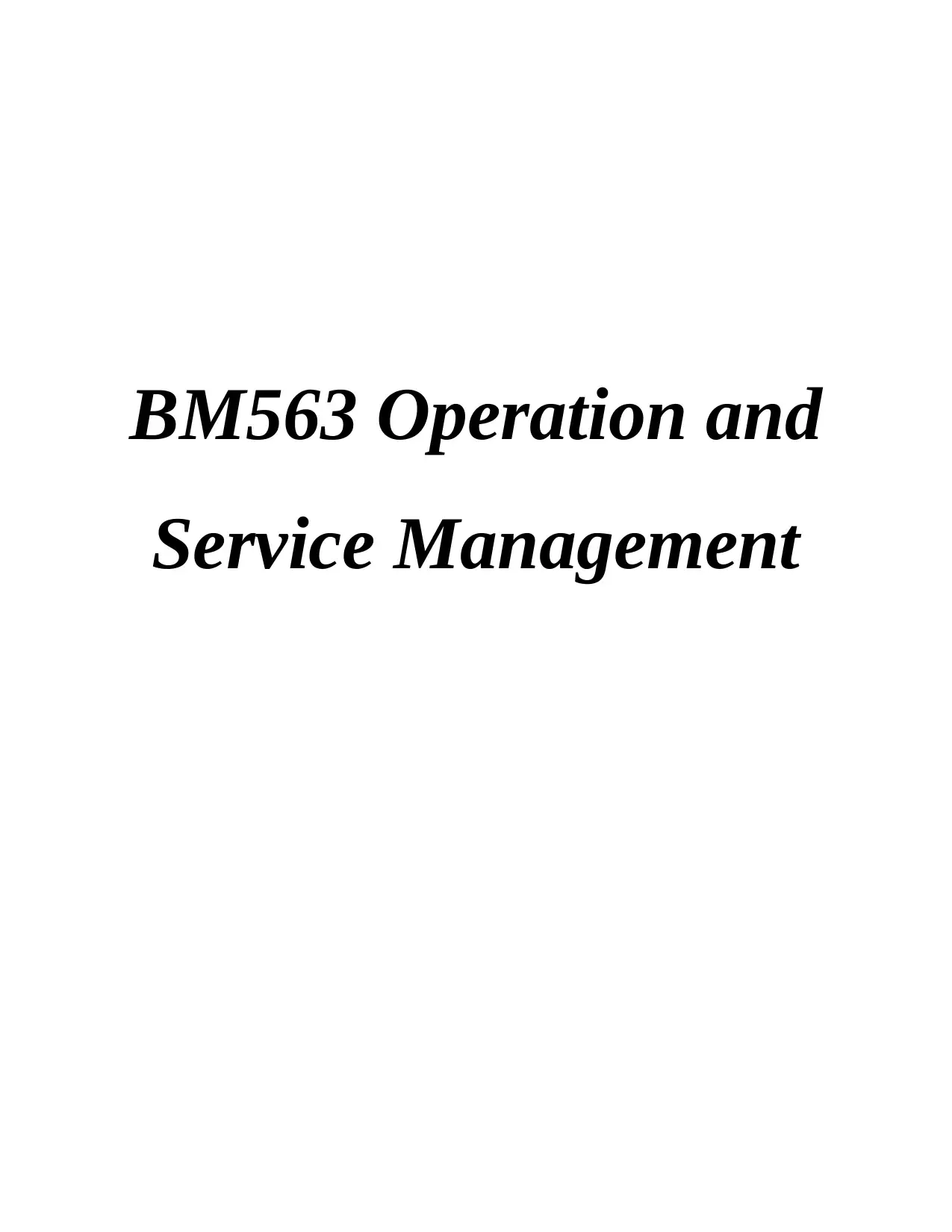
BM563 Operation and
Service Management
Service Management
Paraphrase This Document
Need a fresh take? Get an instant paraphrase of this document with our AI Paraphraser
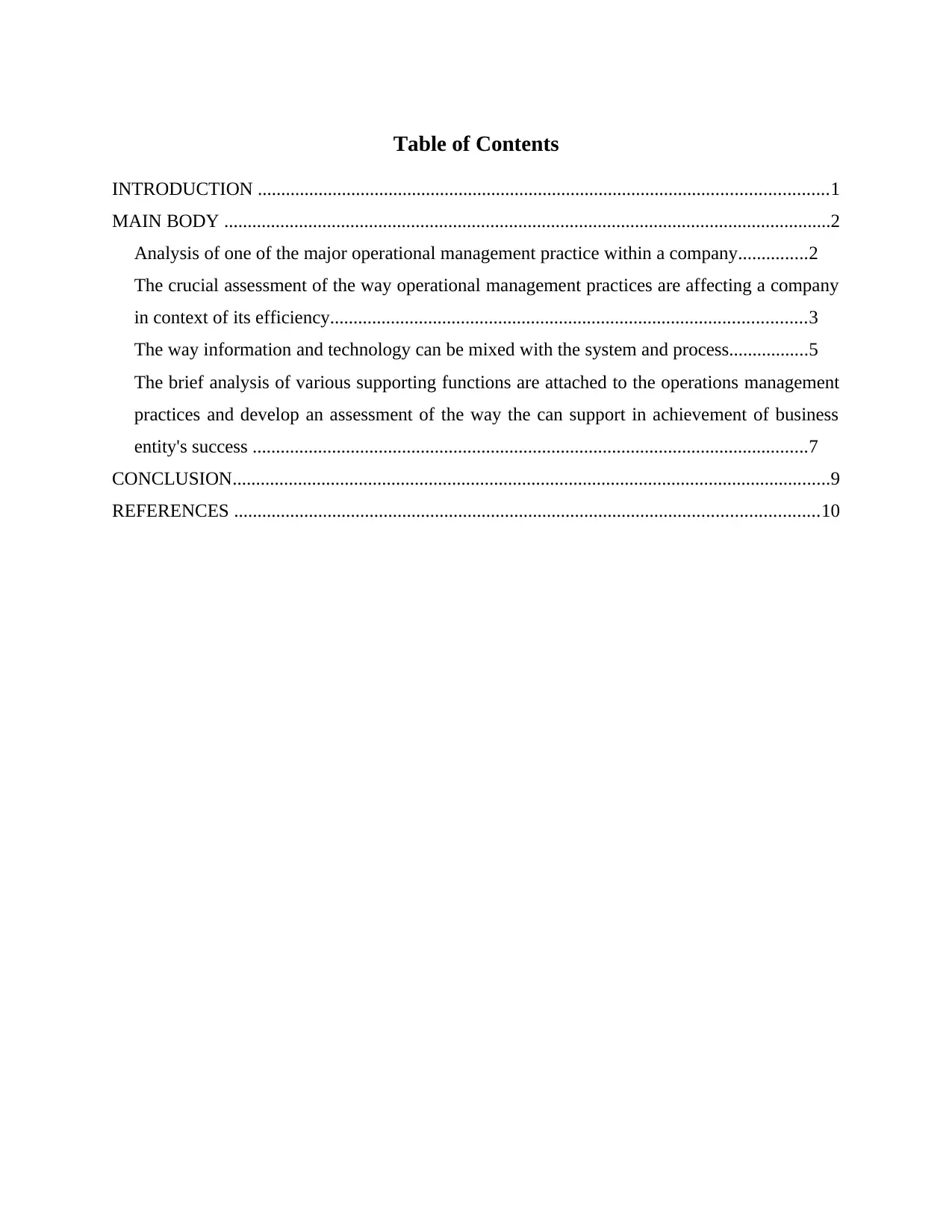
Table of Contents
INTRODUCTION ..........................................................................................................................1
MAIN BODY ..................................................................................................................................2
Analysis of one of the major operational management practice within a company...............2
The crucial assessment of the way operational management practices are affecting a company
in context of its efficiency......................................................................................................3
The way information and technology can be mixed with the system and process.................5
The brief analysis of various supporting functions are attached to the operations management
practices and develop an assessment of the way the can support in achievement of business
entity's success .......................................................................................................................7
CONCLUSION................................................................................................................................9
REFERENCES .............................................................................................................................10
INTRODUCTION ..........................................................................................................................1
MAIN BODY ..................................................................................................................................2
Analysis of one of the major operational management practice within a company...............2
The crucial assessment of the way operational management practices are affecting a company
in context of its efficiency......................................................................................................3
The way information and technology can be mixed with the system and process.................5
The brief analysis of various supporting functions are attached to the operations management
practices and develop an assessment of the way the can support in achievement of business
entity's success .......................................................................................................................7
CONCLUSION................................................................................................................................9
REFERENCES .............................................................................................................................10
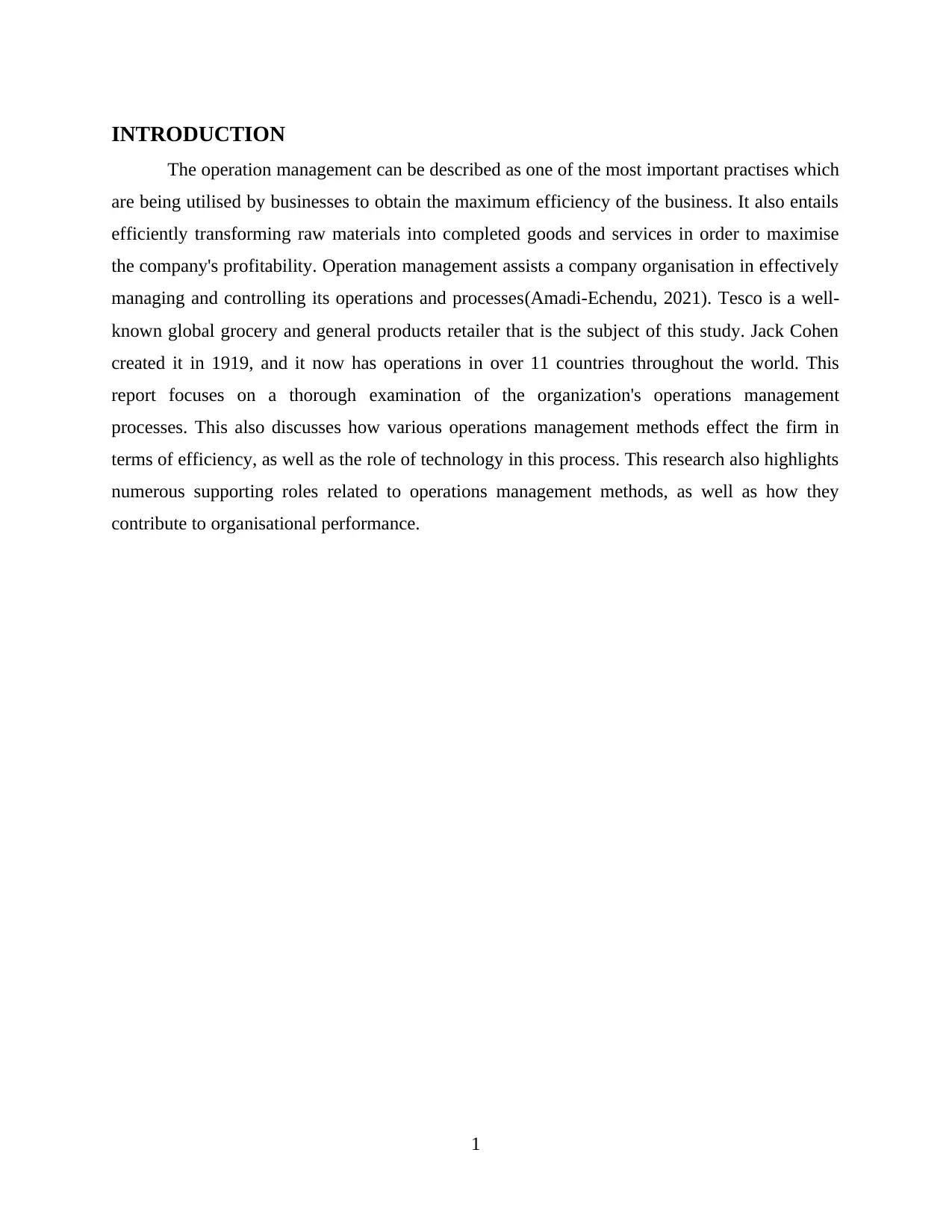
INTRODUCTION
The operation management can be described as one of the most important practises which
are being utilised by businesses to obtain the maximum efficiency of the business. It also entails
efficiently transforming raw materials into completed goods and services in order to maximise
the company's profitability. Operation management assists a company organisation in effectively
managing and controlling its operations and processes(Amadi-Echendu, 2021). Tesco is a well-
known global grocery and general products retailer that is the subject of this study. Jack Cohen
created it in 1919, and it now has operations in over 11 countries throughout the world. This
report focuses on a thorough examination of the organization's operations management
processes. This also discusses how various operations management methods effect the firm in
terms of efficiency, as well as the role of technology in this process. This research also highlights
numerous supporting roles related to operations management methods, as well as how they
contribute to organisational performance.
1
The operation management can be described as one of the most important practises which
are being utilised by businesses to obtain the maximum efficiency of the business. It also entails
efficiently transforming raw materials into completed goods and services in order to maximise
the company's profitability. Operation management assists a company organisation in effectively
managing and controlling its operations and processes(Amadi-Echendu, 2021). Tesco is a well-
known global grocery and general products retailer that is the subject of this study. Jack Cohen
created it in 1919, and it now has operations in over 11 countries throughout the world. This
report focuses on a thorough examination of the organization's operations management
processes. This also discusses how various operations management methods effect the firm in
terms of efficiency, as well as the role of technology in this process. This research also highlights
numerous supporting roles related to operations management methods, as well as how they
contribute to organisational performance.
1
⊘ This is a preview!⊘
Do you want full access?
Subscribe today to unlock all pages.

Trusted by 1+ million students worldwide
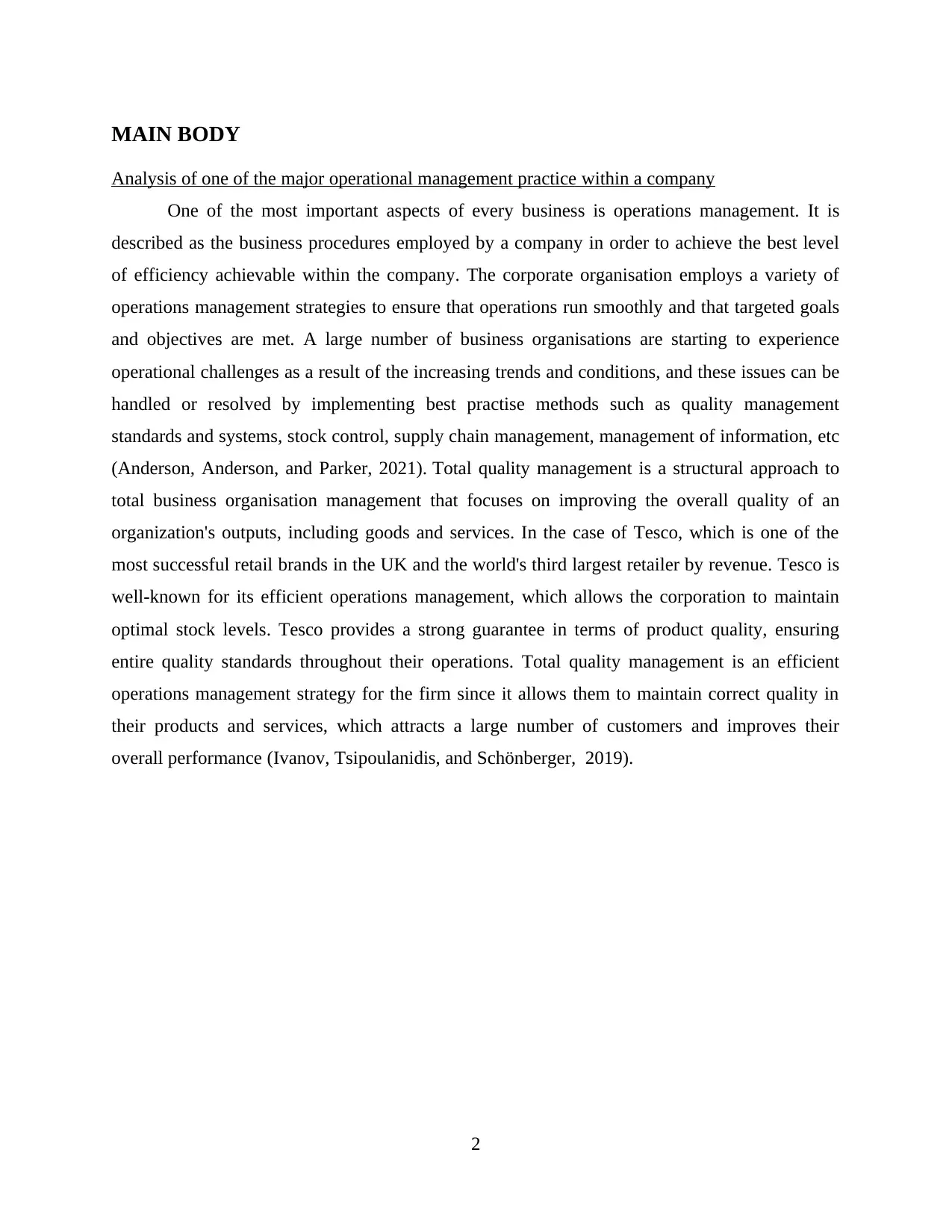
MAIN BODY
Analysis of one of the major operational management practice within a company
One of the most important aspects of every business is operations management. It is
described as the business procedures employed by a company in order to achieve the best level
of efficiency achievable within the company. The corporate organisation employs a variety of
operations management strategies to ensure that operations run smoothly and that targeted goals
and objectives are met. A large number of business organisations are starting to experience
operational challenges as a result of the increasing trends and conditions, and these issues can be
handled or resolved by implementing best practise methods such as quality management
standards and systems, stock control, supply chain management, management of information, etc
(Anderson, Anderson, and Parker, 2021). Total quality management is a structural approach to
total business organisation management that focuses on improving the overall quality of an
organization's outputs, including goods and services. In the case of Tesco, which is one of the
most successful retail brands in the UK and the world's third largest retailer by revenue. Tesco is
well-known for its efficient operations management, which allows the corporation to maintain
optimal stock levels. Tesco provides a strong guarantee in terms of product quality, ensuring
entire quality standards throughout their operations. Total quality management is an efficient
operations management strategy for the firm since it allows them to maintain correct quality in
their products and services, which attracts a large number of customers and improves their
overall performance (Ivanov, Tsipoulanidis, and Schönberger, 2019).
2
Analysis of one of the major operational management practice within a company
One of the most important aspects of every business is operations management. It is
described as the business procedures employed by a company in order to achieve the best level
of efficiency achievable within the company. The corporate organisation employs a variety of
operations management strategies to ensure that operations run smoothly and that targeted goals
and objectives are met. A large number of business organisations are starting to experience
operational challenges as a result of the increasing trends and conditions, and these issues can be
handled or resolved by implementing best practise methods such as quality management
standards and systems, stock control, supply chain management, management of information, etc
(Anderson, Anderson, and Parker, 2021). Total quality management is a structural approach to
total business organisation management that focuses on improving the overall quality of an
organization's outputs, including goods and services. In the case of Tesco, which is one of the
most successful retail brands in the UK and the world's third largest retailer by revenue. Tesco is
well-known for its efficient operations management, which allows the corporation to maintain
optimal stock levels. Tesco provides a strong guarantee in terms of product quality, ensuring
entire quality standards throughout their operations. Total quality management is an efficient
operations management strategy for the firm since it allows them to maintain correct quality in
their products and services, which attracts a large number of customers and improves their
overall performance (Ivanov, Tsipoulanidis, and Schönberger, 2019).
2
Paraphrase This Document
Need a fresh take? Get an instant paraphrase of this document with our AI Paraphraser
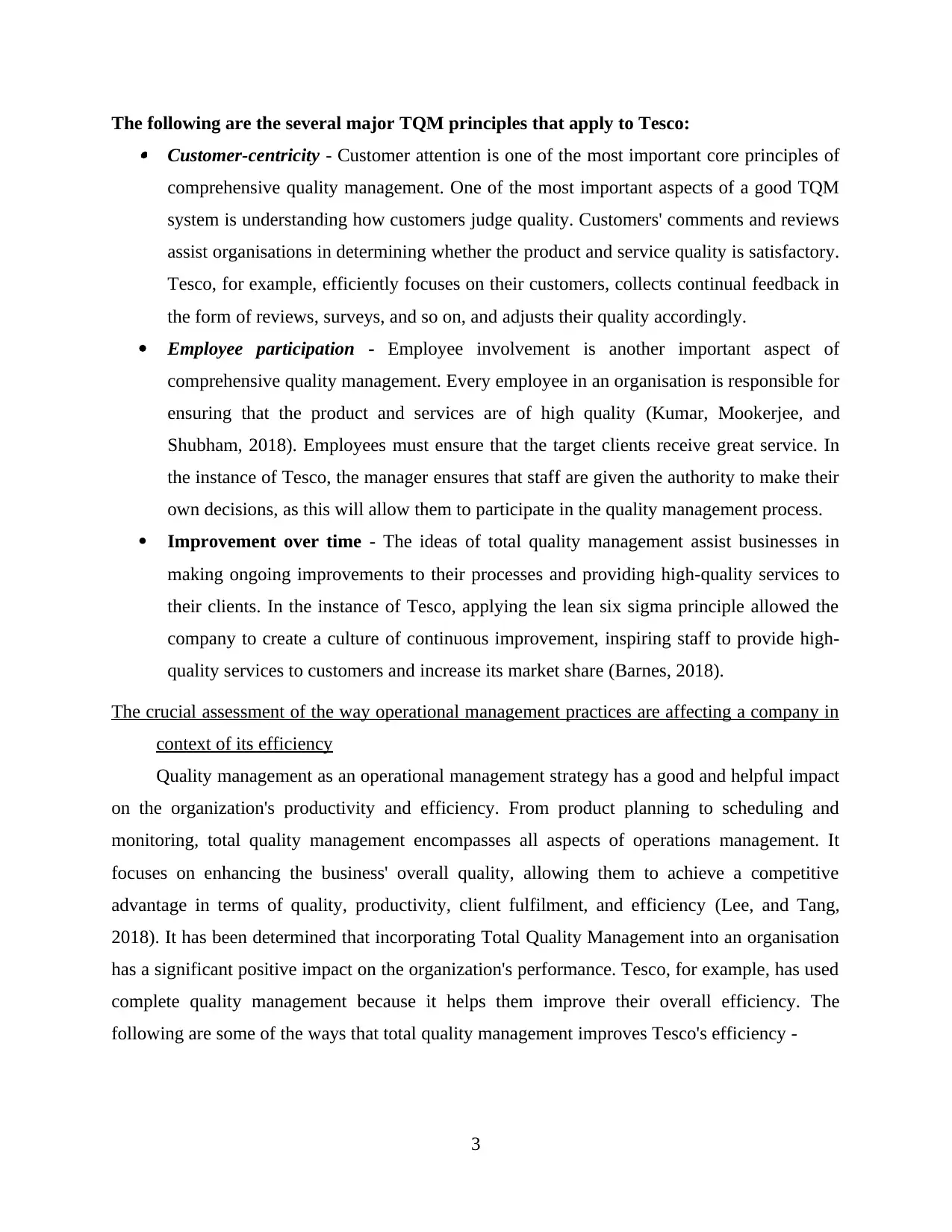
The following are the several major TQM principles that apply to Tesco: Customer-centricity - Customer attention is one of the most important core principles of
comprehensive quality management. One of the most important aspects of a good TQM
system is understanding how customers judge quality. Customers' comments and reviews
assist organisations in determining whether the product and service quality is satisfactory.
Tesco, for example, efficiently focuses on their customers, collects continual feedback in
the form of reviews, surveys, and so on, and adjusts their quality accordingly.
Employee participation - Employee involvement is another important aspect of
comprehensive quality management. Every employee in an organisation is responsible for
ensuring that the product and services are of high quality (Kumar, Mookerjee, and
Shubham, 2018). Employees must ensure that the target clients receive great service. In
the instance of Tesco, the manager ensures that staff are given the authority to make their
own decisions, as this will allow them to participate in the quality management process.
Improvement over time - The ideas of total quality management assist businesses in
making ongoing improvements to their processes and providing high-quality services to
their clients. In the instance of Tesco, applying the lean six sigma principle allowed the
company to create a culture of continuous improvement, inspiring staff to provide high-
quality services to customers and increase its market share (Barnes, 2018).
The crucial assessment of the way operational management practices are affecting a company in
context of its efficiency
Quality management as an operational management strategy has a good and helpful impact
on the organization's productivity and efficiency. From product planning to scheduling and
monitoring, total quality management encompasses all aspects of operations management. It
focuses on enhancing the business' overall quality, allowing them to achieve a competitive
advantage in terms of quality, productivity, client fulfilment, and efficiency (Lee, and Tang,
2018). It has been determined that incorporating Total Quality Management into an organisation
has a significant positive impact on the organization's performance. Tesco, for example, has used
complete quality management because it helps them improve their overall efficiency. The
following are some of the ways that total quality management improves Tesco's efficiency -
3
comprehensive quality management. One of the most important aspects of a good TQM
system is understanding how customers judge quality. Customers' comments and reviews
assist organisations in determining whether the product and service quality is satisfactory.
Tesco, for example, efficiently focuses on their customers, collects continual feedback in
the form of reviews, surveys, and so on, and adjusts their quality accordingly.
Employee participation - Employee involvement is another important aspect of
comprehensive quality management. Every employee in an organisation is responsible for
ensuring that the product and services are of high quality (Kumar, Mookerjee, and
Shubham, 2018). Employees must ensure that the target clients receive great service. In
the instance of Tesco, the manager ensures that staff are given the authority to make their
own decisions, as this will allow them to participate in the quality management process.
Improvement over time - The ideas of total quality management assist businesses in
making ongoing improvements to their processes and providing high-quality services to
their clients. In the instance of Tesco, applying the lean six sigma principle allowed the
company to create a culture of continuous improvement, inspiring staff to provide high-
quality services to customers and increase its market share (Barnes, 2018).
The crucial assessment of the way operational management practices are affecting a company in
context of its efficiency
Quality management as an operational management strategy has a good and helpful impact
on the organization's productivity and efficiency. From product planning to scheduling and
monitoring, total quality management encompasses all aspects of operations management. It
focuses on enhancing the business' overall quality, allowing them to achieve a competitive
advantage in terms of quality, productivity, client fulfilment, and efficiency (Lee, and Tang,
2018). It has been determined that incorporating Total Quality Management into an organisation
has a significant positive impact on the organization's performance. Tesco, for example, has used
complete quality management because it helps them improve their overall efficiency. The
following are some of the ways that total quality management improves Tesco's efficiency -
3
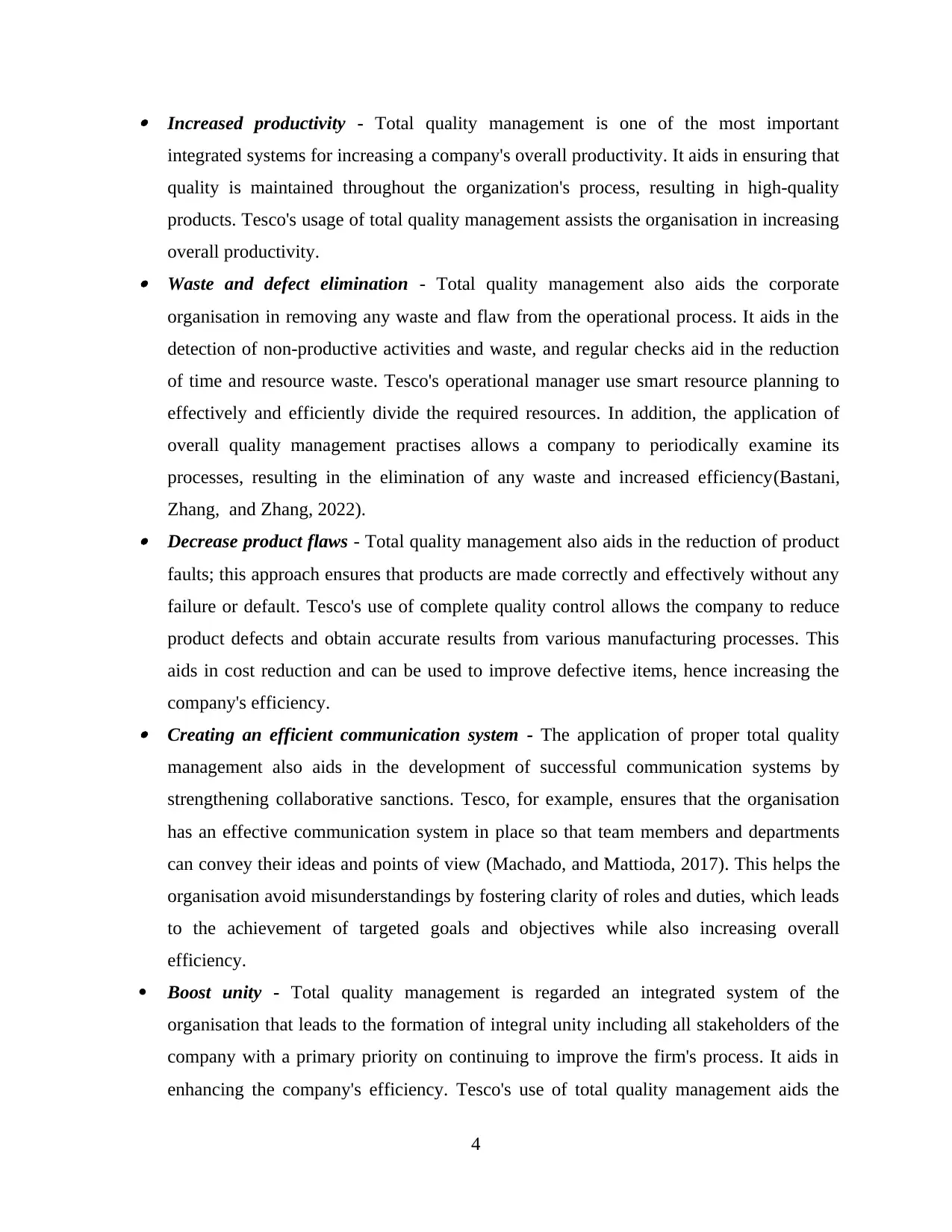
Increased productivity - Total quality management is one of the most important
integrated systems for increasing a company's overall productivity. It aids in ensuring that
quality is maintained throughout the organization's process, resulting in high-quality
products. Tesco's usage of total quality management assists the organisation in increasing
overall productivity. Waste and defect elimination - Total quality management also aids the corporate
organisation in removing any waste and flaw from the operational process. It aids in the
detection of non-productive activities and waste, and regular checks aid in the reduction
of time and resource waste. Tesco's operational manager use smart resource planning to
effectively and efficiently divide the required resources. In addition, the application of
overall quality management practises allows a company to periodically examine its
processes, resulting in the elimination of any waste and increased efficiency(Bastani,
Zhang, and Zhang, 2022). Decrease product flaws - Total quality management also aids in the reduction of product
faults; this approach ensures that products are made correctly and effectively without any
failure or default. Tesco's use of complete quality control allows the company to reduce
product defects and obtain accurate results from various manufacturing processes. This
aids in cost reduction and can be used to improve defective items, hence increasing the
company's efficiency. Creating an efficient communication system - The application of proper total quality
management also aids in the development of successful communication systems by
strengthening collaborative sanctions. Tesco, for example, ensures that the organisation
has an effective communication system in place so that team members and departments
can convey their ideas and points of view (Machado, and Mattioda, 2017). This helps the
organisation avoid misunderstandings by fostering clarity of roles and duties, which leads
to the achievement of targeted goals and objectives while also increasing overall
efficiency.
Boost unity - Total quality management is regarded an integrated system of the
organisation that leads to the formation of integral unity including all stakeholders of the
company with a primary priority on continuing to improve the firm's process. It aids in
enhancing the company's efficiency. Tesco's use of total quality management aids the
4
integrated systems for increasing a company's overall productivity. It aids in ensuring that
quality is maintained throughout the organization's process, resulting in high-quality
products. Tesco's usage of total quality management assists the organisation in increasing
overall productivity. Waste and defect elimination - Total quality management also aids the corporate
organisation in removing any waste and flaw from the operational process. It aids in the
detection of non-productive activities and waste, and regular checks aid in the reduction
of time and resource waste. Tesco's operational manager use smart resource planning to
effectively and efficiently divide the required resources. In addition, the application of
overall quality management practises allows a company to periodically examine its
processes, resulting in the elimination of any waste and increased efficiency(Bastani,
Zhang, and Zhang, 2022). Decrease product flaws - Total quality management also aids in the reduction of product
faults; this approach ensures that products are made correctly and effectively without any
failure or default. Tesco's use of complete quality control allows the company to reduce
product defects and obtain accurate results from various manufacturing processes. This
aids in cost reduction and can be used to improve defective items, hence increasing the
company's efficiency. Creating an efficient communication system - The application of proper total quality
management also aids in the development of successful communication systems by
strengthening collaborative sanctions. Tesco, for example, ensures that the organisation
has an effective communication system in place so that team members and departments
can convey their ideas and points of view (Machado, and Mattioda, 2017). This helps the
organisation avoid misunderstandings by fostering clarity of roles and duties, which leads
to the achievement of targeted goals and objectives while also increasing overall
efficiency.
Boost unity - Total quality management is regarded an integrated system of the
organisation that leads to the formation of integral unity including all stakeholders of the
company with a primary priority on continuing to improve the firm's process. It aids in
enhancing the company's efficiency. Tesco's use of total quality management aids the
4
⊘ This is a preview!⊘
Do you want full access?
Subscribe today to unlock all pages.

Trusted by 1+ million students worldwide
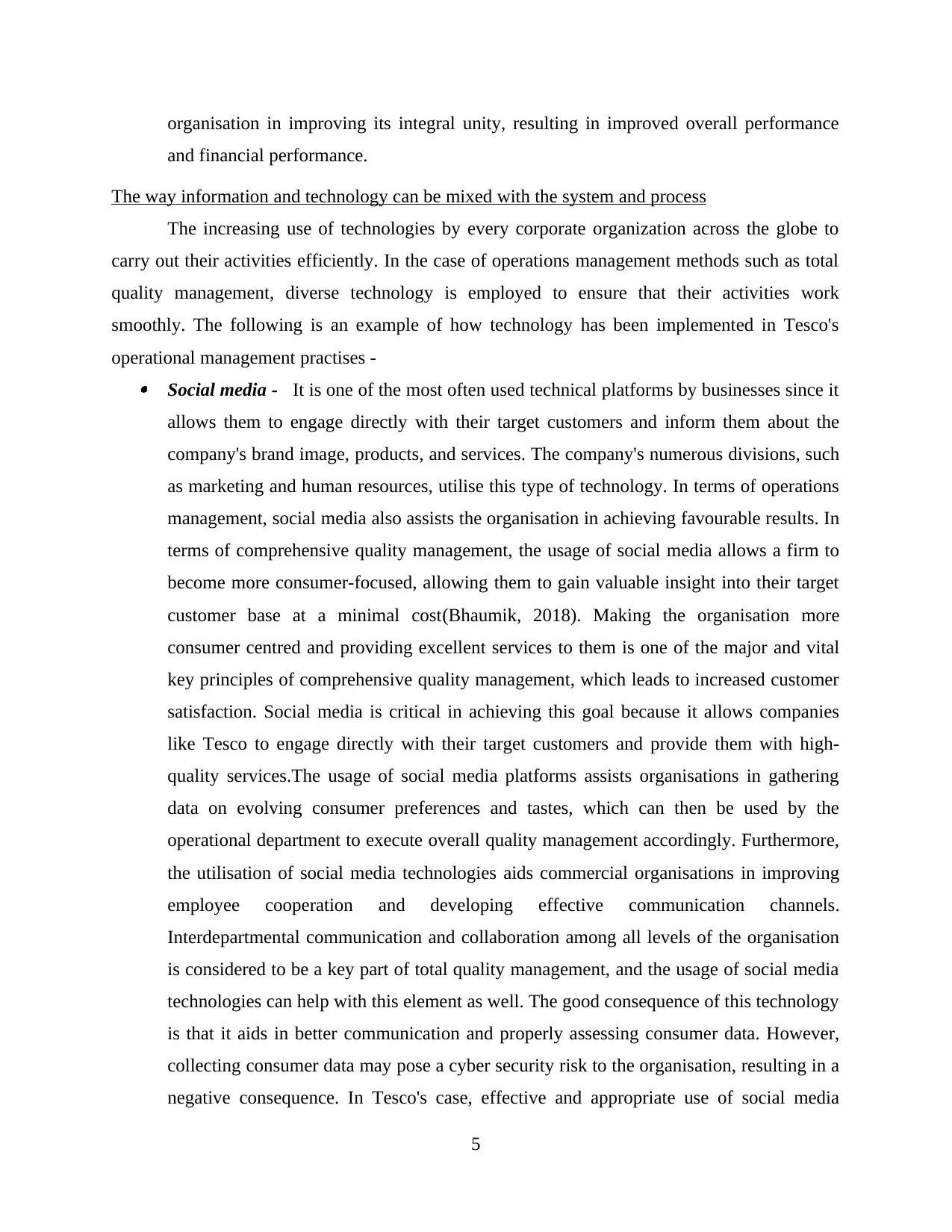
organisation in improving its integral unity, resulting in improved overall performance
and financial performance.
The way information and technology can be mixed with the system and process
The increasing use of technologies by every corporate organization across the globe to
carry out their activities efficiently. In the case of operations management methods such as total
quality management, diverse technology is employed to ensure that their activities work
smoothly. The following is an example of how technology has been implemented in Tesco's
operational management practises - Social media - It is one of the most often used technical platforms by businesses since it
allows them to engage directly with their target customers and inform them about the
company's brand image, products, and services. The company's numerous divisions, such
as marketing and human resources, utilise this type of technology. In terms of operations
management, social media also assists the organisation in achieving favourable results. In
terms of comprehensive quality management, the usage of social media allows a firm to
become more consumer-focused, allowing them to gain valuable insight into their target
customer base at a minimal cost(Bhaumik, 2018). Making the organisation more
consumer centred and providing excellent services to them is one of the major and vital
key principles of comprehensive quality management, which leads to increased customer
satisfaction. Social media is critical in achieving this goal because it allows companies
like Tesco to engage directly with their target customers and provide them with high-
quality services.The usage of social media platforms assists organisations in gathering
data on evolving consumer preferences and tastes, which can then be used by the
operational department to execute overall quality management accordingly. Furthermore,
the utilisation of social media technologies aids commercial organisations in improving
employee cooperation and developing effective communication channels.
Interdepartmental communication and collaboration among all levels of the organisation
is considered to be a key part of total quality management, and the usage of social media
technologies can help with this element as well. The good consequence of this technology
is that it aids in better communication and properly assessing consumer data. However,
collecting consumer data may pose a cyber security risk to the organisation, resulting in a
negative consequence. In Tesco's case, effective and appropriate use of social media
5
and financial performance.
The way information and technology can be mixed with the system and process
The increasing use of technologies by every corporate organization across the globe to
carry out their activities efficiently. In the case of operations management methods such as total
quality management, diverse technology is employed to ensure that their activities work
smoothly. The following is an example of how technology has been implemented in Tesco's
operational management practises - Social media - It is one of the most often used technical platforms by businesses since it
allows them to engage directly with their target customers and inform them about the
company's brand image, products, and services. The company's numerous divisions, such
as marketing and human resources, utilise this type of technology. In terms of operations
management, social media also assists the organisation in achieving favourable results. In
terms of comprehensive quality management, the usage of social media allows a firm to
become more consumer-focused, allowing them to gain valuable insight into their target
customer base at a minimal cost(Bhaumik, 2018). Making the organisation more
consumer centred and providing excellent services to them is one of the major and vital
key principles of comprehensive quality management, which leads to increased customer
satisfaction. Social media is critical in achieving this goal because it allows companies
like Tesco to engage directly with their target customers and provide them with high-
quality services.The usage of social media platforms assists organisations in gathering
data on evolving consumer preferences and tastes, which can then be used by the
operational department to execute overall quality management accordingly. Furthermore,
the utilisation of social media technologies aids commercial organisations in improving
employee cooperation and developing effective communication channels.
Interdepartmental communication and collaboration among all levels of the organisation
is considered to be a key part of total quality management, and the usage of social media
technologies can help with this element as well. The good consequence of this technology
is that it aids in better communication and properly assessing consumer data. However,
collecting consumer data may pose a cyber security risk to the organisation, resulting in a
negative consequence. In Tesco's case, effective and appropriate use of social media
5
Paraphrase This Document
Need a fresh take? Get an instant paraphrase of this document with our AI Paraphraser
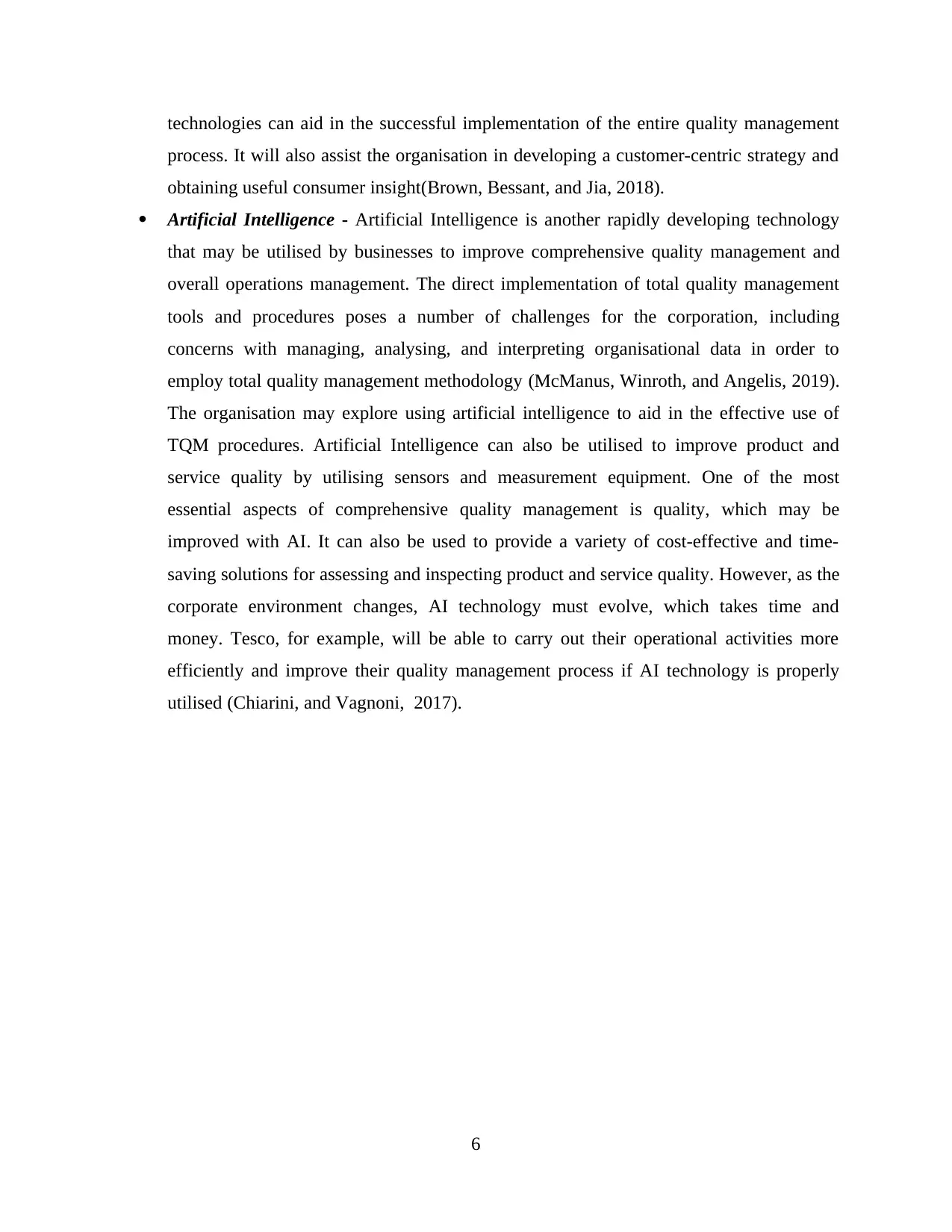
technologies can aid in the successful implementation of the entire quality management
process. It will also assist the organisation in developing a customer-centric strategy and
obtaining useful consumer insight(Brown, Bessant, and Jia, 2018).
Artificial Intelligence - Artificial Intelligence is another rapidly developing technology
that may be utilised by businesses to improve comprehensive quality management and
overall operations management. The direct implementation of total quality management
tools and procedures poses a number of challenges for the corporation, including
concerns with managing, analysing, and interpreting organisational data in order to
employ total quality management methodology (McManus, Winroth, and Angelis, 2019).
The organisation may explore using artificial intelligence to aid in the effective use of
TQM procedures. Artificial Intelligence can also be utilised to improve product and
service quality by utilising sensors and measurement equipment. One of the most
essential aspects of comprehensive quality management is quality, which may be
improved with AI. It can also be used to provide a variety of cost-effective and time-
saving solutions for assessing and inspecting product and service quality. However, as the
corporate environment changes, AI technology must evolve, which takes time and
money. Tesco, for example, will be able to carry out their operational activities more
efficiently and improve their quality management process if AI technology is properly
utilised (Chiarini, and Vagnoni, 2017).
6
process. It will also assist the organisation in developing a customer-centric strategy and
obtaining useful consumer insight(Brown, Bessant, and Jia, 2018).
Artificial Intelligence - Artificial Intelligence is another rapidly developing technology
that may be utilised by businesses to improve comprehensive quality management and
overall operations management. The direct implementation of total quality management
tools and procedures poses a number of challenges for the corporation, including
concerns with managing, analysing, and interpreting organisational data in order to
employ total quality management methodology (McManus, Winroth, and Angelis, 2019).
The organisation may explore using artificial intelligence to aid in the effective use of
TQM procedures. Artificial Intelligence can also be utilised to improve product and
service quality by utilising sensors and measurement equipment. One of the most
essential aspects of comprehensive quality management is quality, which may be
improved with AI. It can also be used to provide a variety of cost-effective and time-
saving solutions for assessing and inspecting product and service quality. However, as the
corporate environment changes, AI technology must evolve, which takes time and
money. Tesco, for example, will be able to carry out their operational activities more
efficiently and improve their quality management process if AI technology is properly
utilised (Chiarini, and Vagnoni, 2017).
6
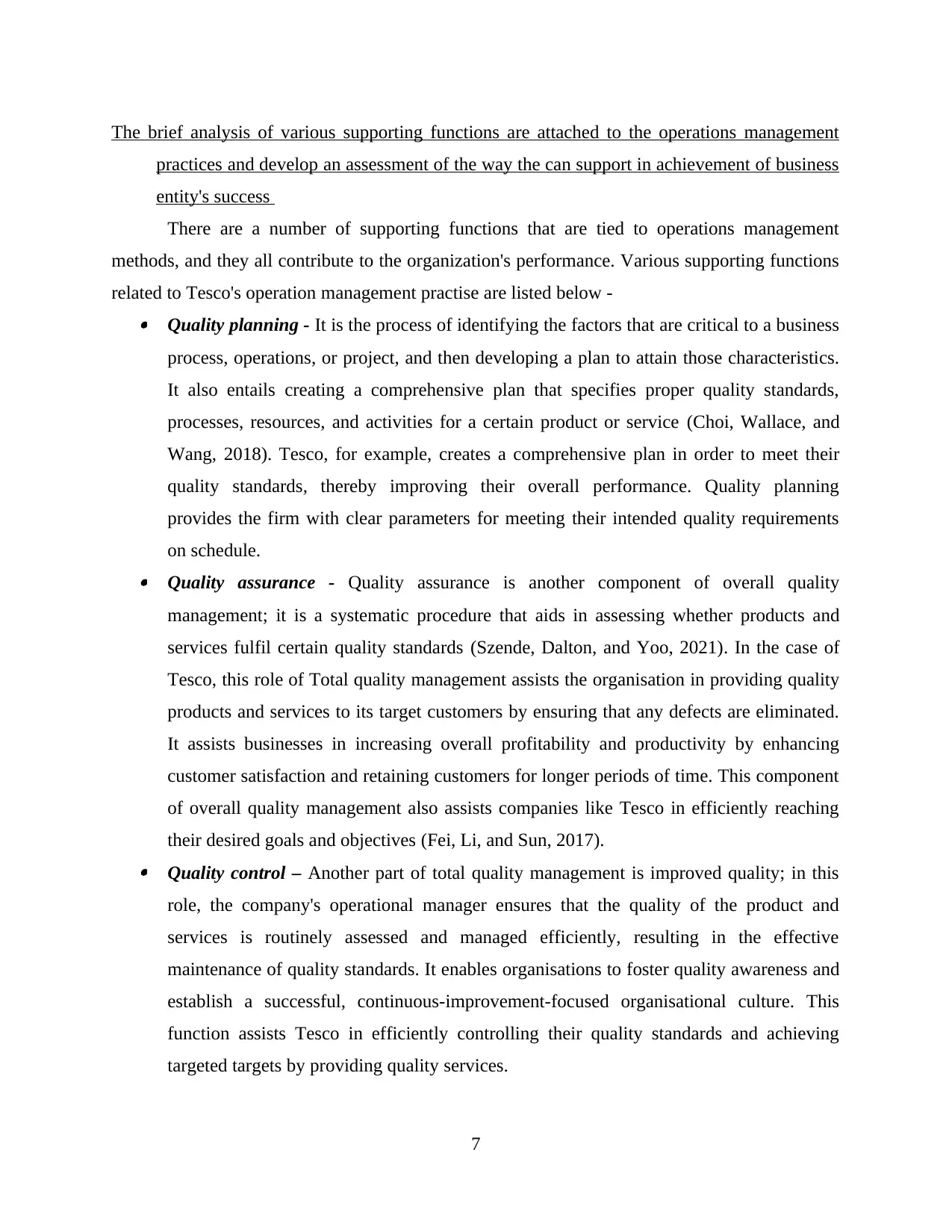
The brief analysis of various supporting functions are attached to the operations management
practices and develop an assessment of the way the can support in achievement of business
entity's success
There are a number of supporting functions that are tied to operations management
methods, and they all contribute to the organization's performance. Various supporting functions
related to Tesco's operation management practise are listed below - Quality planning - It is the process of identifying the factors that are critical to a business
process, operations, or project, and then developing a plan to attain those characteristics.
It also entails creating a comprehensive plan that specifies proper quality standards,
processes, resources, and activities for a certain product or service (Choi, Wallace, and
Wang, 2018). Tesco, for example, creates a comprehensive plan in order to meet their
quality standards, thereby improving their overall performance. Quality planning
provides the firm with clear parameters for meeting their intended quality requirements
on schedule. Quality assurance - Quality assurance is another component of overall quality
management; it is a systematic procedure that aids in assessing whether products and
services fulfil certain quality standards (Szende, Dalton, and Yoo, 2021). In the case of
Tesco, this role of Total quality management assists the organisation in providing quality
products and services to its target customers by ensuring that any defects are eliminated.
It assists businesses in increasing overall profitability and productivity by enhancing
customer satisfaction and retaining customers for longer periods of time. This component
of overall quality management also assists companies like Tesco in efficiently reaching
their desired goals and objectives (Fei, Li, and Sun, 2017). Quality control – Another part of total quality management is improved quality; in this
role, the company's operational manager ensures that the quality of the product and
services is routinely assessed and managed efficiently, resulting in the effective
maintenance of quality standards. It enables organisations to foster quality awareness and
establish a successful, continuous-improvement-focused organisational culture. This
function assists Tesco in efficiently controlling their quality standards and achieving
targeted targets by providing quality services.
7
practices and develop an assessment of the way the can support in achievement of business
entity's success
There are a number of supporting functions that are tied to operations management
methods, and they all contribute to the organization's performance. Various supporting functions
related to Tesco's operation management practise are listed below - Quality planning - It is the process of identifying the factors that are critical to a business
process, operations, or project, and then developing a plan to attain those characteristics.
It also entails creating a comprehensive plan that specifies proper quality standards,
processes, resources, and activities for a certain product or service (Choi, Wallace, and
Wang, 2018). Tesco, for example, creates a comprehensive plan in order to meet their
quality standards, thereby improving their overall performance. Quality planning
provides the firm with clear parameters for meeting their intended quality requirements
on schedule. Quality assurance - Quality assurance is another component of overall quality
management; it is a systematic procedure that aids in assessing whether products and
services fulfil certain quality standards (Szende, Dalton, and Yoo, 2021). In the case of
Tesco, this role of Total quality management assists the organisation in providing quality
products and services to its target customers by ensuring that any defects are eliminated.
It assists businesses in increasing overall profitability and productivity by enhancing
customer satisfaction and retaining customers for longer periods of time. This component
of overall quality management also assists companies like Tesco in efficiently reaching
their desired goals and objectives (Fei, Li, and Sun, 2017). Quality control – Another part of total quality management is improved quality; in this
role, the company's operational manager ensures that the quality of the product and
services is routinely assessed and managed efficiently, resulting in the effective
maintenance of quality standards. It enables organisations to foster quality awareness and
establish a successful, continuous-improvement-focused organisational culture. This
function assists Tesco in efficiently controlling their quality standards and achieving
targeted targets by providing quality services.
7
⊘ This is a preview!⊘
Do you want full access?
Subscribe today to unlock all pages.

Trusted by 1+ million students worldwide
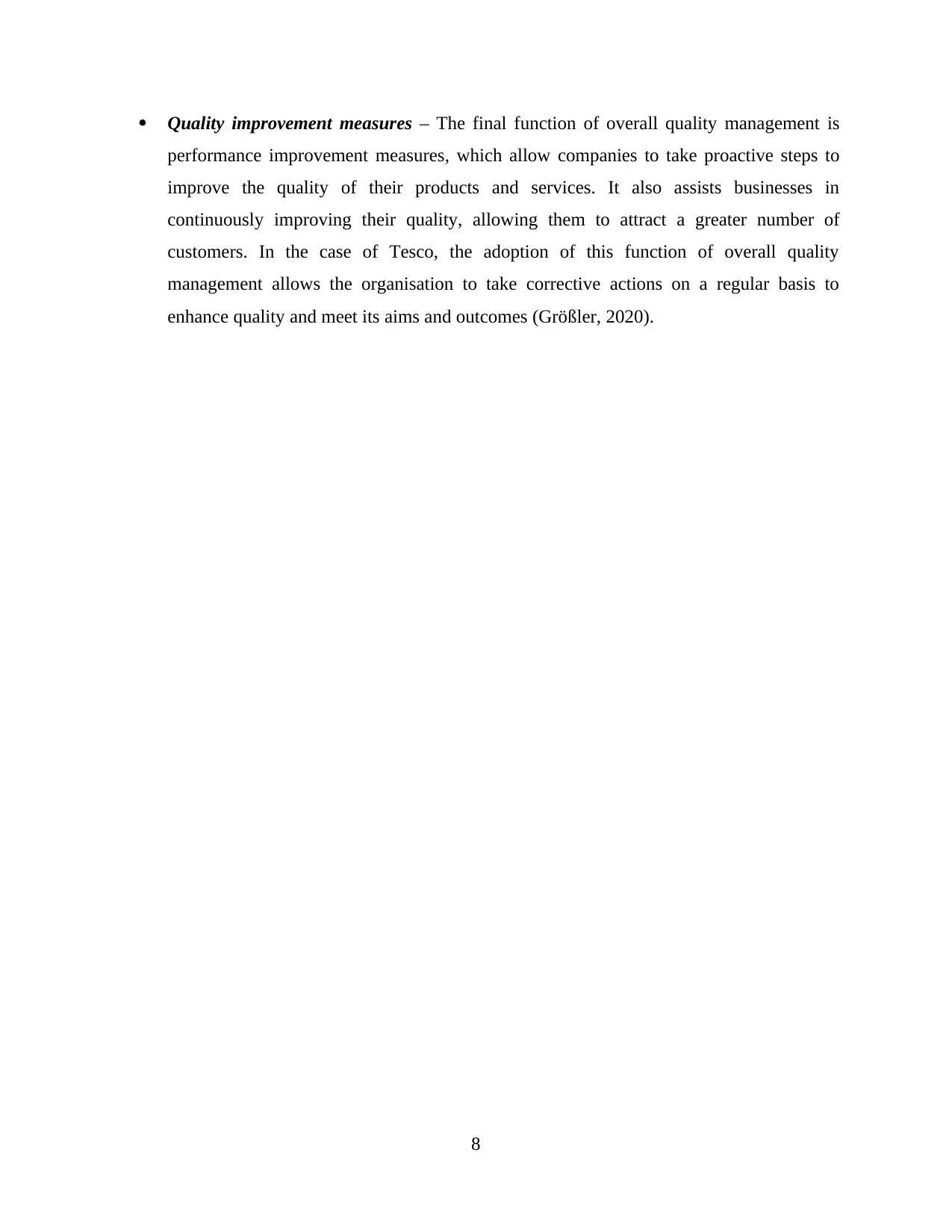
Quality improvement measures – The final function of overall quality management is
performance improvement measures, which allow companies to take proactive steps to
improve the quality of their products and services. It also assists businesses in
continuously improving their quality, allowing them to attract a greater number of
customers. In the case of Tesco, the adoption of this function of overall quality
management allows the organisation to take corrective actions on a regular basis to
enhance quality and meet its aims and outcomes (Größler, 2020).
8
performance improvement measures, which allow companies to take proactive steps to
improve the quality of their products and services. It also assists businesses in
continuously improving their quality, allowing them to attract a greater number of
customers. In the case of Tesco, the adoption of this function of overall quality
management allows the organisation to take corrective actions on a regular basis to
enhance quality and meet its aims and outcomes (Größler, 2020).
8
Paraphrase This Document
Need a fresh take? Get an instant paraphrase of this document with our AI Paraphraser
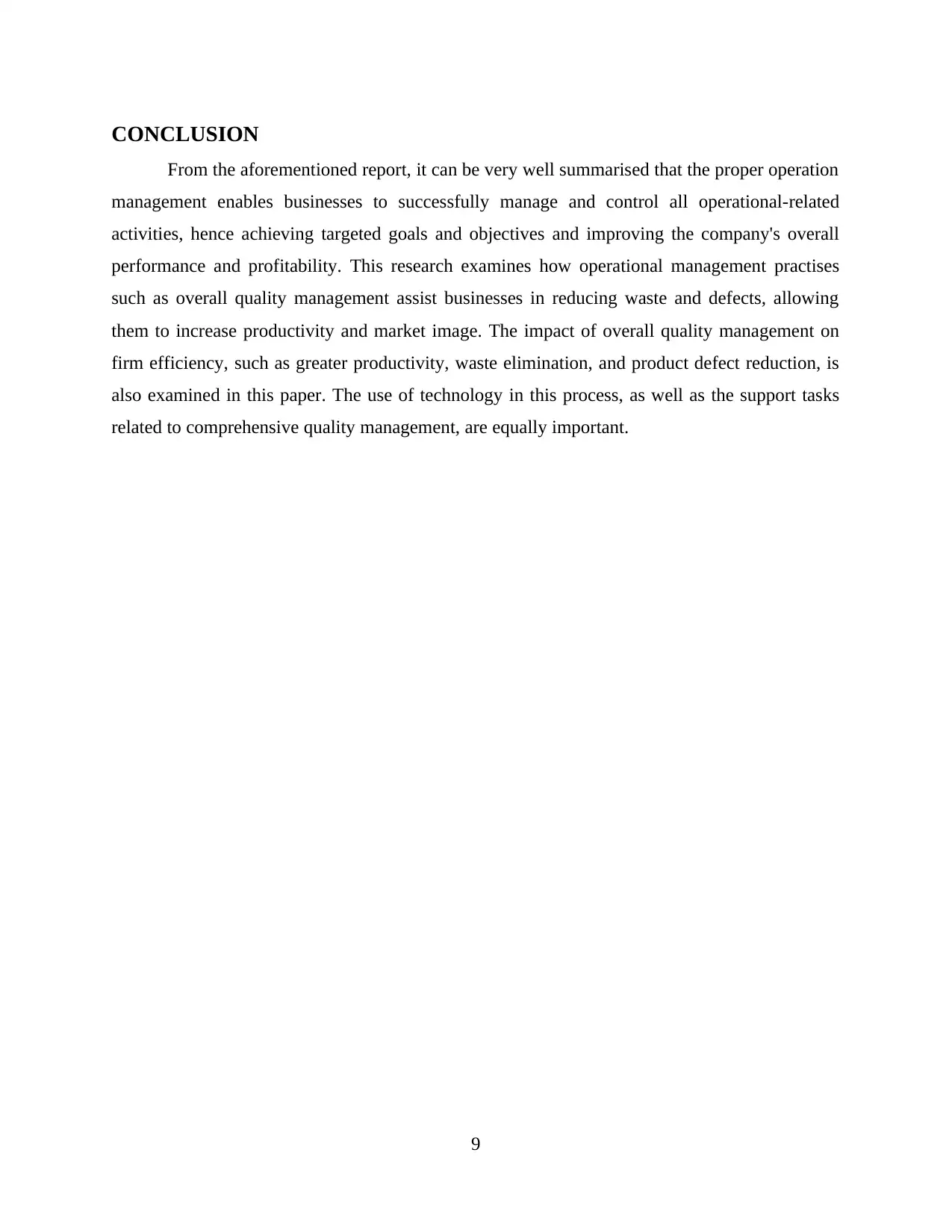
CONCLUSION
From the aforementioned report, it can be very well summarised that the proper operation
management enables businesses to successfully manage and control all operational-related
activities, hence achieving targeted goals and objectives and improving the company's overall
performance and profitability. This research examines how operational management practises
such as overall quality management assist businesses in reducing waste and defects, allowing
them to increase productivity and market image. The impact of overall quality management on
firm efficiency, such as greater productivity, waste elimination, and product defect reduction, is
also examined in this paper. The use of technology in this process, as well as the support tasks
related to comprehensive quality management, are equally important.
9
From the aforementioned report, it can be very well summarised that the proper operation
management enables businesses to successfully manage and control all operational-related
activities, hence achieving targeted goals and objectives and improving the company's overall
performance and profitability. This research examines how operational management practises
such as overall quality management assist businesses in reducing waste and defects, allowing
them to increase productivity and market image. The impact of overall quality management on
firm efficiency, such as greater productivity, waste elimination, and product defect reduction, is
also examined in this paper. The use of technology in this process, as well as the support tasks
related to comprehensive quality management, are equally important.
9
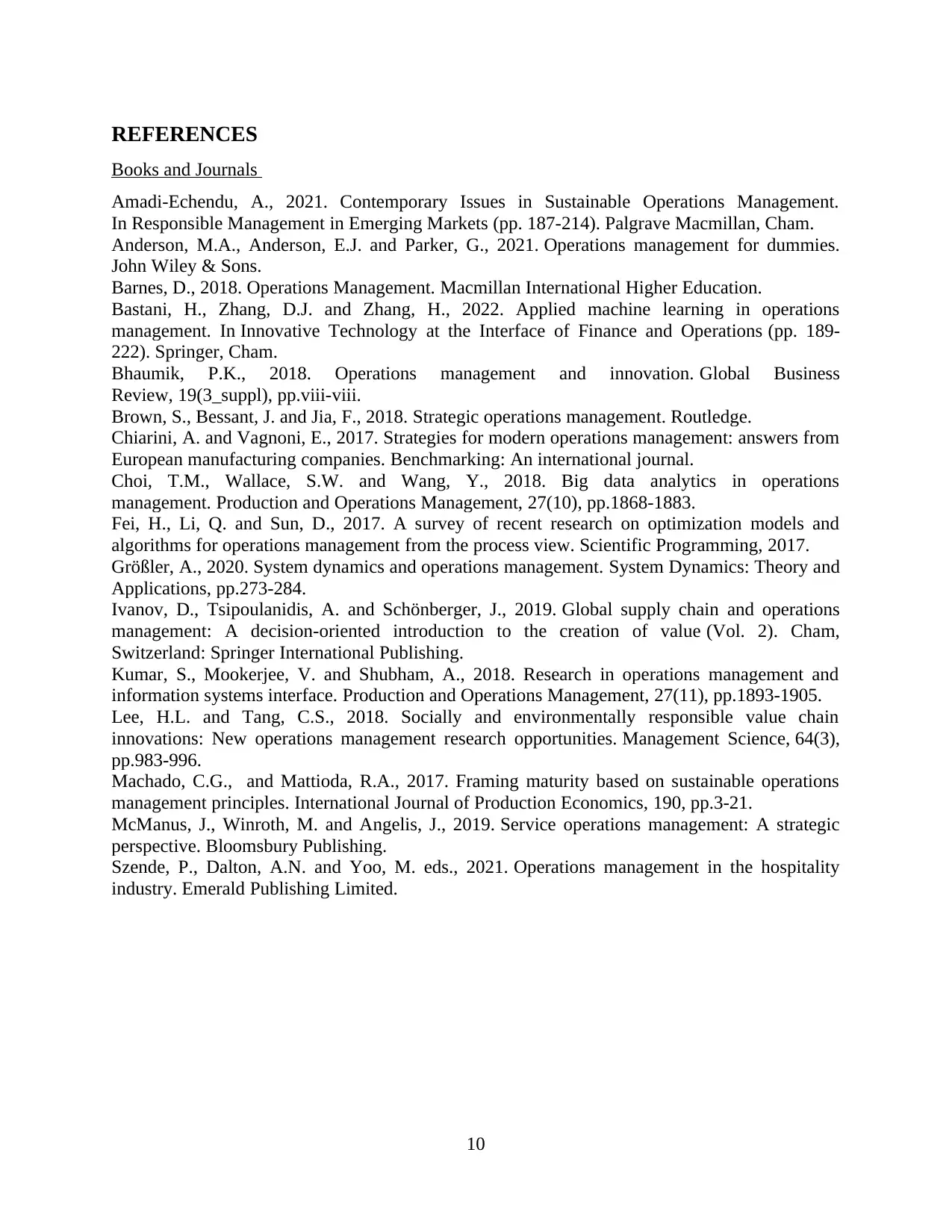
REFERENCES
Books and Journals
Amadi-Echendu, A., 2021. Contemporary Issues in Sustainable Operations Management.
In Responsible Management in Emerging Markets (pp. 187-214). Palgrave Macmillan, Cham.
Anderson, M.A., Anderson, E.J. and Parker, G., 2021. Operations management for dummies.
John Wiley & Sons.
Barnes, D., 2018. Operations Management. Macmillan International Higher Education.
Bastani, H., Zhang, D.J. and Zhang, H., 2022. Applied machine learning in operations
management. In Innovative Technology at the Interface of Finance and Operations (pp. 189-
222). Springer, Cham.
Bhaumik, P.K., 2018. Operations management and innovation. Global Business
Review, 19(3_suppl), pp.viii-viii.
Brown, S., Bessant, J. and Jia, F., 2018. Strategic operations management. Routledge.
Chiarini, A. and Vagnoni, E., 2017. Strategies for modern operations management: answers from
European manufacturing companies. Benchmarking: An international journal.
Choi, T.M., Wallace, S.W. and Wang, Y., 2018. Big data analytics in operations
management. Production and Operations Management, 27(10), pp.1868-1883.
Fei, H., Li, Q. and Sun, D., 2017. A survey of recent research on optimization models and
algorithms for operations management from the process view. Scientific Programming, 2017.
Größler, A., 2020. System dynamics and operations management. System Dynamics: Theory and
Applications, pp.273-284.
Ivanov, D., Tsipoulanidis, A. and Schönberger, J., 2019. Global supply chain and operations
management: A decision-oriented introduction to the creation of value (Vol. 2). Cham,
Switzerland: Springer International Publishing.
Kumar, S., Mookerjee, V. and Shubham, A., 2018. Research in operations management and
information systems interface. Production and Operations Management, 27(11), pp.1893-1905.
Lee, H.L. and Tang, C.S., 2018. Socially and environmentally responsible value chain
innovations: New operations management research opportunities. Management Science, 64(3),
pp.983-996.
Machado, C.G., and Mattioda, R.A., 2017. Framing maturity based on sustainable operations
management principles. International Journal of Production Economics, 190, pp.3-21.
McManus, J., Winroth, M. and Angelis, J., 2019. Service operations management: A strategic
perspective. Bloomsbury Publishing.
Szende, P., Dalton, A.N. and Yoo, M. eds., 2021. Operations management in the hospitality
industry. Emerald Publishing Limited.
10
Books and Journals
Amadi-Echendu, A., 2021. Contemporary Issues in Sustainable Operations Management.
In Responsible Management in Emerging Markets (pp. 187-214). Palgrave Macmillan, Cham.
Anderson, M.A., Anderson, E.J. and Parker, G., 2021. Operations management for dummies.
John Wiley & Sons.
Barnes, D., 2018. Operations Management. Macmillan International Higher Education.
Bastani, H., Zhang, D.J. and Zhang, H., 2022. Applied machine learning in operations
management. In Innovative Technology at the Interface of Finance and Operations (pp. 189-
222). Springer, Cham.
Bhaumik, P.K., 2018. Operations management and innovation. Global Business
Review, 19(3_suppl), pp.viii-viii.
Brown, S., Bessant, J. and Jia, F., 2018. Strategic operations management. Routledge.
Chiarini, A. and Vagnoni, E., 2017. Strategies for modern operations management: answers from
European manufacturing companies. Benchmarking: An international journal.
Choi, T.M., Wallace, S.W. and Wang, Y., 2018. Big data analytics in operations
management. Production and Operations Management, 27(10), pp.1868-1883.
Fei, H., Li, Q. and Sun, D., 2017. A survey of recent research on optimization models and
algorithms for operations management from the process view. Scientific Programming, 2017.
Größler, A., 2020. System dynamics and operations management. System Dynamics: Theory and
Applications, pp.273-284.
Ivanov, D., Tsipoulanidis, A. and Schönberger, J., 2019. Global supply chain and operations
management: A decision-oriented introduction to the creation of value (Vol. 2). Cham,
Switzerland: Springer International Publishing.
Kumar, S., Mookerjee, V. and Shubham, A., 2018. Research in operations management and
information systems interface. Production and Operations Management, 27(11), pp.1893-1905.
Lee, H.L. and Tang, C.S., 2018. Socially and environmentally responsible value chain
innovations: New operations management research opportunities. Management Science, 64(3),
pp.983-996.
Machado, C.G., and Mattioda, R.A., 2017. Framing maturity based on sustainable operations
management principles. International Journal of Production Economics, 190, pp.3-21.
McManus, J., Winroth, M. and Angelis, J., 2019. Service operations management: A strategic
perspective. Bloomsbury Publishing.
Szende, P., Dalton, A.N. and Yoo, M. eds., 2021. Operations management in the hospitality
industry. Emerald Publishing Limited.
10
⊘ This is a preview!⊘
Do you want full access?
Subscribe today to unlock all pages.

Trusted by 1+ million students worldwide
1 out of 12
Related Documents
Your All-in-One AI-Powered Toolkit for Academic Success.
+13062052269
info@desklib.com
Available 24*7 on WhatsApp / Email
![[object Object]](/_next/static/media/star-bottom.7253800d.svg)
Unlock your academic potential
Copyright © 2020–2026 A2Z Services. All Rights Reserved. Developed and managed by ZUCOL.





